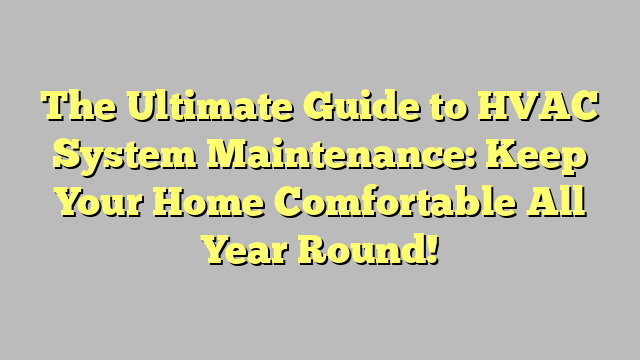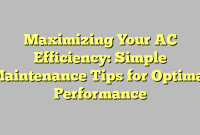Maintaining your HVAC (Heating, Ventilation, and Air Conditioning) system is crucial for the comfort and well-being of your home. Regular maintenance not only ensures that your system operates efficiently, but it also extends its lifespan and helps you avoid costly repairs. Neglecting HVAC system maintenance can lead to decreased performance, increased energy consumption, and even health issues due to poor indoor air quality. By prioritizing regular maintenance, you can enjoy a comfortable home environment while saving money in the long run.
One of the key benefits of regular HVAC system maintenance is improved energy efficiency. When your system is well-maintained, it operates at peak performance, using less energy to heat or cool your home. This not only reduces your carbon footprint but also lowers your utility bills. Additionally, a well-maintained HVAC system will have fewer breakdowns and require fewer repairs, saving you money on costly emergency repairs.
The Basics of HVAC Systems: How They Work and What They Do
HVAC systems are responsible for maintaining a comfortable indoor environment by regulating temperature, humidity, and air quality. They consist of various components that work together to provide heating, cooling, and ventilation.
The main components of an HVAC system include the furnace or heat pump for heating, the air conditioner for cooling, the ductwork for distributing air throughout the home, and the thermostat for controlling the temperature. The furnace or heat pump heats the air and then distributes it through the ductwork using a blower motor. The air conditioner cools the air by removing heat and humidity from it. The thermostat allows you to set the desired temperature and controls when the heating or cooling system turns on and off.
Signs Your HVAC System Needs Maintenance: Warning Signals to Look Out For
There are several warning signs that indicate your HVAC system needs maintenance. These signs should not be ignored as they can lead to more serious issues if left unaddressed.
One common sign is reduced airflow. If you notice that the air coming out of your vents is weak or not as strong as it used to be, it could be a sign of a clogged air filter or a problem with the blower motor. Another sign is uneven heating or cooling. If certain areas of your home are consistently warmer or cooler than others, it could indicate a problem with the ductwork or an issue with the thermostat.
Strange noises coming from your HVAC system are also a cause for concern. Rattling, banging, or squealing noises could indicate loose or worn-out parts that need to be repaired or replaced. Additionally, if you notice a sudden increase in your energy bills without any changes in your usage, it could be a sign that your HVAC system is not operating efficiently and needs maintenance.
DIY HVAC Maintenance: Simple Steps You Can Take to Keep Your System Running Smoothly
While some HVAC maintenance tasks require professional expertise, there are several simple steps you can take yourself to keep your system running smoothly.
One of the most important DIY maintenance tasks is regularly changing the air filters. Air filters help trap dust, pollen, and other airborne particles, preventing them from circulating in your home. Over time, these filters can become clogged, reducing airflow and putting strain on your HVAC system. By changing the filters every 1-3 months, depending on the type of filter and the level of pollutants in your home, you can ensure optimal performance and indoor air quality.
Another DIY maintenance task is cleaning the outdoor unit of your air conditioner. The outdoor unit can accumulate dirt, leaves, and debris, which can obstruct airflow and reduce efficiency. By regularly cleaning the unit and removing any obstructions, you can help maintain proper airflow and prevent damage to the system.
Professional HVAC Maintenance: When to Call in the Experts
While DIY maintenance tasks are important, it is also crucial to schedule regular professional HVAC maintenance. Professional maintenance involves a thorough inspection and cleaning of your system by trained technicians.
Professional maintenance typically includes tasks such as checking and tightening electrical connections, lubricating moving parts, inspecting and cleaning the condensate drain, and testing the system’s performance. These tasks require specialized knowledge and equipment, making it essential to hire a professional HVAC technician.
It is recommended to schedule professional maintenance at least once a year, ideally before the start of the heating or cooling season. Regular professional maintenance not only ensures that your system operates efficiently but also helps identify and address any potential issues before they become major problems.
HVAC Filters: How to Choose the Right Type and How Often to Replace Them
HVAC filters play a crucial role in maintaining indoor air quality and protecting your HVAC system from dust and debris. Choosing the right type of filter and replacing it regularly is essential for optimal performance.
When choosing an HVAC filter, consider factors such as the level of filtration needed, the size of the filter, and the type of filter material. There are various types of filters available, ranging from basic fiberglass filters to high-efficiency particulate air (HEPA) filters. HEPA filters provide the highest level of filtration but may require modifications to your HVAC system due to their thickness.
The frequency of filter replacement depends on several factors, including the type of filter, the level of pollutants in your home, and whether you have pets or allergies. As a general guideline, it is recommended to replace standard filters every 1-3 months. However, if you have pets or allergies or live in an area with high levels of pollutants, you may need to replace them more frequently.
Ductwork Maintenance: Why It’s Important and How to Do It
Ductwork plays a crucial role in distributing heated or cooled air throughout your home. Over time, ductwork can accumulate dust, dirt, and other debris, which can obstruct airflow and reduce the efficiency of your HVAC system. Regular ductwork maintenance is essential to ensure proper airflow and prevent issues such as uneven heating or cooling.
One important step in ductwork maintenance is inspecting the ducts for any visible signs of damage or leaks. Look for loose connections, holes, or gaps in the ductwork and seal them using duct tape or mastic sealant. Additionally, it is important to clean the ducts periodically to remove any accumulated dust and debris. This can be done using a vacuum cleaner with a brush attachment or by hiring a professional duct cleaning service.
Thermostat Maintenance: How to Calibrate and Adjust Your Thermostat for Optimal Comfort
The thermostat is the control center of your HVAC system, allowing you to set the desired temperature and control when the heating or cooling system turns on and off. Proper thermostat maintenance is essential for optimal comfort and energy efficiency.
One important step in thermostat maintenance is calibrating the thermostat. Over time, thermostats can become inaccurate, leading to temperature discrepancies and increased energy consumption. To calibrate your thermostat, compare its reading to an accurate thermometer placed nearby. If there is a significant difference, you may need to adjust the thermostat settings or replace it if it cannot be calibrated.
Another important aspect of thermostat maintenance is adjusting the temperature settings based on your schedule and preferences. Consider programming your thermostat to lower the temperature when you are away from home or asleep to save energy. Additionally, make sure that the thermostat is located away from direct sunlight, drafts, or heat sources that can affect its accuracy.
Seasonal HVAC Maintenance: Tips for Preparing Your System for Summer and Winter
Seasonal HVAC maintenance is crucial for ensuring that your system operates efficiently during the summer and winter months when it is under the most strain.
Before the start of the cooling season, it is important to clean and inspect the outdoor unit of your air conditioner. Remove any debris, such as leaves or branches, and clean the coils using a soft brush or a garden hose. Additionally, check the refrigerant levels and inspect the electrical connections for any signs of damage or wear.
Before the start of the heating season, it is important to clean and inspect the furnace or heat pump. Remove any dust or debris from the unit and check the burner, ignition system, and heat exchanger for any issues. Additionally, check the ductwork for leaks or damage and seal them if necessary.
Common HVAC Problems and How to Troubleshoot Them
Despite regular maintenance, HVAC systems can still experience issues from time to time. Knowing how to troubleshoot common problems can help you identify and address issues promptly.
One common problem is a frozen air conditioner. This can be caused by a dirty air filter, low refrigerant levels, or a malfunctioning blower motor. To troubleshoot this issue, start by checking and replacing the air filter if necessary. If the problem persists, it is best to call a professional HVAC technician to diagnose and repair the issue.
Another common problem is a malfunctioning thermostat. If your HVAC system is not turning on or off as expected, it could be due to a faulty thermostat. Start by checking the batteries and replacing them if necessary. If that does not solve the issue, try resetting the thermostat or recalibrating it. If all else fails, it may be time to replace the thermostat.
The Benefits of Regular HVAC Maintenance for Your Home and Your Wallet
Regular HVAC system maintenance is essential for maintaining a comfortable home environment and avoiding costly repairs. By prioritizing maintenance tasks such as changing air filters, cleaning outdoor units, and scheduling professional inspections, you can ensure that your system operates efficiently and lasts longer.
The benefits of regular HVAC maintenance are numerous. It improves energy efficiency, lowers utility bills, extends the lifespan of your system, and improves indoor air quality. Additionally, regular maintenance helps identify and address potential issues before they become major problems, saving you money on costly repairs.
In conclusion, HVAC system maintenance should be a top priority for homeowners. By taking simple steps to maintain your system and scheduling regular professional maintenance, you can enjoy a comfortable home environment while saving money in the long run. Don’t neglect your HVAC system – prioritize its maintenance and reap the benefits.




